The World Assembly for Women in Tokyo, a global meeting, was held Sept. 12-14. Political leaders, business leaders, and opinion leaders from around the world were invited to Tokyo to discuss and disseminate a plan to promote women’s active roles. The event was jointly hosted by the Government of Japan, the Japan Business Federation (Keidanren), Nikkei Inc. and the Japan Institute of International Affairs.
The Japanese government describes the World Assembly for Women in Tokyo (WAW! Tokyo 2014) as “the Women's Version of the Davos Forum” (1), gathering women leaders active in the world.
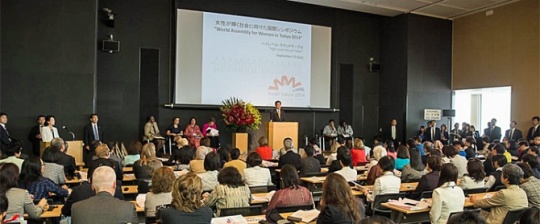
The opening session of the High Level Round Table held on September 13.
At an open forum on the first day entitled “Women’s Power as a Source of Growth” Christine Lagarde, managing director of the International Monetary Fund, gave a speech on the economic effects of empowering women. That was followed by a speech by Prime Minister Shinzo Abe.
At the High Level Round Table on the second day, meetings were held by sub-groups after an opening session. JICA President Akihiko Tanaka participated in a group discussion entitled “Future ‘Human Security’ and Women.”
Women’s Power as a Source of Growth
At the opening speech on Sept. 12, Prime Minister Abe touched on his appointment of five women as Cabinet ministers during the recent Cabinet re-shuffle, and said that he would like to realize a society where every woman can strive for her dream any time, and that he would like to support women’s activities.
In the keynote speech, Lagarde said that utilization of women (their participation in work) is required in economic growth. She pointed out that in addition to economic policy and legal system development, the mindset of people and society have to change to accept women’s activity.
After the keynote speech, a dialogue was held between Akie Abe, Abe's wife, and Cherie Blair, founder of Cherie Blair Foundation for Women and wife of former prime minister of the UK. Then a video message from Hillary Clinton, former secretary of State of the U.S., was shown. Clinton said that by achieving widely inclusive prosperity, women, the source that is crucial to growth, can be set free.
A diverse set of people participated in the opening forum, including Caroline Kennedy, ambassador of the U.S. to Japan; Anne Sweeney, co-chair, Disney Media Networks and president, Disney/ABC Television Group, U.S.; and Akiko Yamanaka, senior diplomatic fellow, Cambridge Central Asia Forum, Cambridge University. The venue was filled with excitement.
Discussing concrete policies at the High Level Round Table on the second day
At the High Level Round Table held Sept. 13, more than 80 panelists from 25 countries, including Japan, and six international organizations discussed measures to promote women’s activity in two sub-groups, and Minister of Foreign Affairs Fumio Kishida organized the opinions of the panelists as chairman.
At the opening session, Abe gave a speech again, saying firmly that he wants to make this opportunity, in which active women from all round the world get together to have inclusive discussion, the beginning of sharing knowledge and solutions. He also touched on the current situation of a Pakistani farming village where JICA provides assistance to the development of schools for girls. He said that in some places the school enrollment rate of girls aged 10 to 12 is less than 10 percent, and the world needs to work as one to take actions so that women can receive such services as healthcare and education as easily as men.
United Nations Development Programme (UNDP) Administrator Helen Clark, who subsequently gave a speech, referred to the efforts of UNDP and Japan partnering to work on issues related to gender and said that experts of gender-equality from all over the world had gathered in one place, but she hoped this movement would be reflected in policies of each country and in discussions on the Post-2015 (2) Development Agenda.
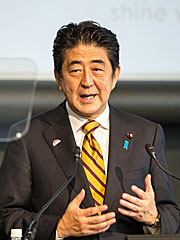
Prime Minister Shinzo Abe also emphasized strengthening Japan's partnership with UN Women.
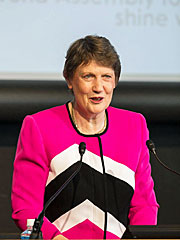
United Nations Development Programme Administrator Helen Clark expects gender equality to be reflected in the discussion for the Post-2015 Development Agenda.
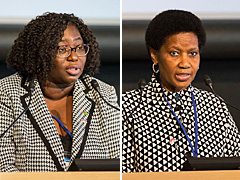
Dede Ahoefa Ekoue, minister of Social Action, Women Promotion and Literacy, Togo, left, says the percentage of female Diet members has increased to 17 percent. Phumzile Mlambo-Ngcuka, executive director of UN Women, wishes to strengthen the organization's partnership with Japan.
Phumzile Mlambo-Ngcuka, executive director of UN Women, the United Nations organization dedicated to gender equality and the empowerment of women, said that womenomics, utilizing women’s power to activate economies, will lead to sustainable societies that bear profit, and she said she expected that the Japanese government would realize an effect of womenomics toward its macro economy.
Dede Ahoefa Ekoue, minister of Social Action, Women Promotion and Literacy, Togo, talked about activities in West Africa to empower women with assistance from Japan that are making a substantial impact on society.
Future ‘Human Security’ and Women
At the following sub-group session, the participants were divided into “Sub-group 1: Promoting Women’s Active Roles in the Economy” and “Sub-group 2: Global Issues and Women’s Initiatives.” They then attended one of three small groups in each sub-group to have in-depth discussions.

There were 84 participants in a plenary session of the sub-groups.
Tanaka attended Small Group 1 of the Sub-group 2, “Future ‘Human Security’ and Women.” In this group, sectors such as food, nutrition, health, agriculture and economy were discussed among the participants, who included Catherine M. Russell, U.S. ambassador-at-large for Global Women’s Issues, U.S.; Clark from UNDP; Ertharin Cousin, executive director of the UN World Food Programme; Adina Othman, deputy minister of Culture, Youth and Sports, Brunei; Nwe Nwe Oo, director general, Department of Health Planning, Ministry of Health, Myanmar; Aiko Doden, NHK senior commentator; Mitsuko Horiuchi, professor, Bunkyo Gakuin University Graduate School of Foreign Studies; Nobuko Kurosaki, president, Médecins Sans Frontières Japon; and Kiyoko Ikegami, professor, Graduate School of Social and Cultural Studies, Nihon University.
In a discussion on agriculture and the economic sector, Tanaka introduced a project in Kenya, Smallholder Horticulture Empowerment and Promotion Unit Project (SHEP), as an example of improving the economic situation of farmers by increasing women’s participation in agriculture. He added that the project also led to participation in management by women and more men taking on domestic roles. He also said he recognizes that for human security, the role of a healthy market is also important.
Showing a framework for discussion and contributing to compiling proposals
To start the discussion aimed at making proposals by the group “Future ‘Human Security’ and Women,” Tanaka suggested a discussion framework: the concept of human security, characteristics of the human security approach, threats to human security and their causes, and his observations on human security and women/gender. He contributed to organizing proposals by stressing the importance of gender mainstreaming for improving the resilience of society to crises and for responding to them.
The group made a proposal to respond to the immediate needs of women and children, and to make strategic investments for the empowerment of women. At the end, Foreign Minister Fumio Kishida, as chair, summarized proposals from all groups as a High Level Round Table proposal called “WAW! To Do.”
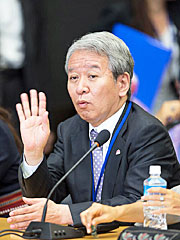
JICA President Tanaka stresses the importance of gender mainstreaming to improve the resilience of society to crises.
After symposium participants visited sites and participated in activities outside Tokyo, WAW! Tokyo 2014 came to a close on Sept. 14. While efforts are being made toward “a society where women shine” as a primary agenda of the government, JICA will continue to work on further efforts for concrete results by positioning human security and gender equality/empowerment of women as critical development agenda items.
Notes:
- 1 . Annual meeting of the World Economic Forum (WEF), held in Davos, a holiday resorts in Switzerland every January. WEF is headquartered in Geneva. Political, business, academic and other leaders of society from around the world gather for the meeting.
- 2 . International development goals that will succeed the Millennium Development Goals, the due date for which is in 2015.




scroll